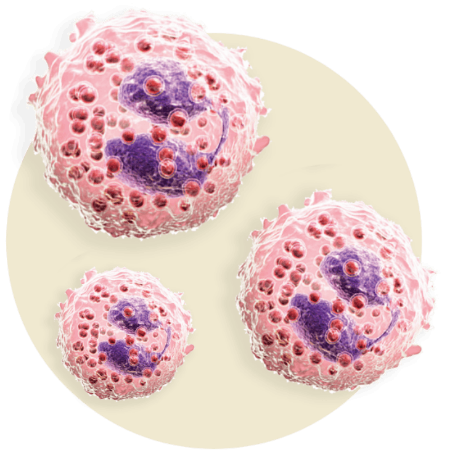What is severe asthma?
Let's start with one potential cause: eosinophils2,3


Could you have severe asthma?
Poor symptom control
Are you coughing, wheezing, having difficulty breathing, frequently using a rescue inhaler, or waking up at night?
Worsening asthma
Having flare-ups? These are also called exacerbations or severe asthma attacks—when symptoms don't improve and you need to add oral steroids.
ED visits or hospitalisations
Is the severity of your asthma attacks sending you to the ED or requiring hospitalisation?
Let's prep for next steps with your doctor.
Tell your doctor when your symptoms get worse. Your symptoms may require you to see a specialist.
Tell your doctor everything you're doing to manage your severe asthma, and talk about how your asthma is affecting your life.
Ask for a blood test to see if you have severe eosinophilic asthma and if NUCALA may be right for you.

 Break the asthma cycle
Break the asthma cycle
Repeated asthma attacks and inflammation caused by long-term, uncontrolled asthma can lead to more asthma attacks or exacerbations.3
So, why NUCALA?
Ready to talk to your doctor?
Important Safety Information:
Do not use NUCALA if you are allergic (hypersensitive) to mepolizumab or any of the ingredients in NUCALA.
Do not use to treat sudden breathing problems.
The most common side effects of NUCALA are headache, injection site reactions (pain, redness, swelling, itching, or a burning feeling at the injection site), back pain, and fatigue.
Tell your doctor or get emergency help right away if you think you are having an allergic reaction to NUCALA.
Any information provided on this website should be discussed with a healthcare professional and does not replace a healthcare professional's advice.
References:
- Data Sheet GlaxoSmithKline New Zealand. Nucala Data Sheet. GSK NZ; 2022. Available at http://www.medsafe.govt.nz/profs/datasheet/dsform.asp
- Consumer Medicine Information GlaxoSmithKline New Zealand. Nucala Consumer Medicine Information. GSK NZ; 2023. Available at https://www.medsafe.govt.nz/Medicines/infoSearch.asp
- Global Initiative for Asthma. Global Strategy for Asthma Management and Prevention 2022. Available from: www.ginasthma.org
- Bernstein D, Pavord ID, Chapman KR et al. Usability of mepolizumab single-use prefilled autoinjector for patient self-administration. J Asthma 2019;28:1-12
This website is intended for residents of New Zealand only.